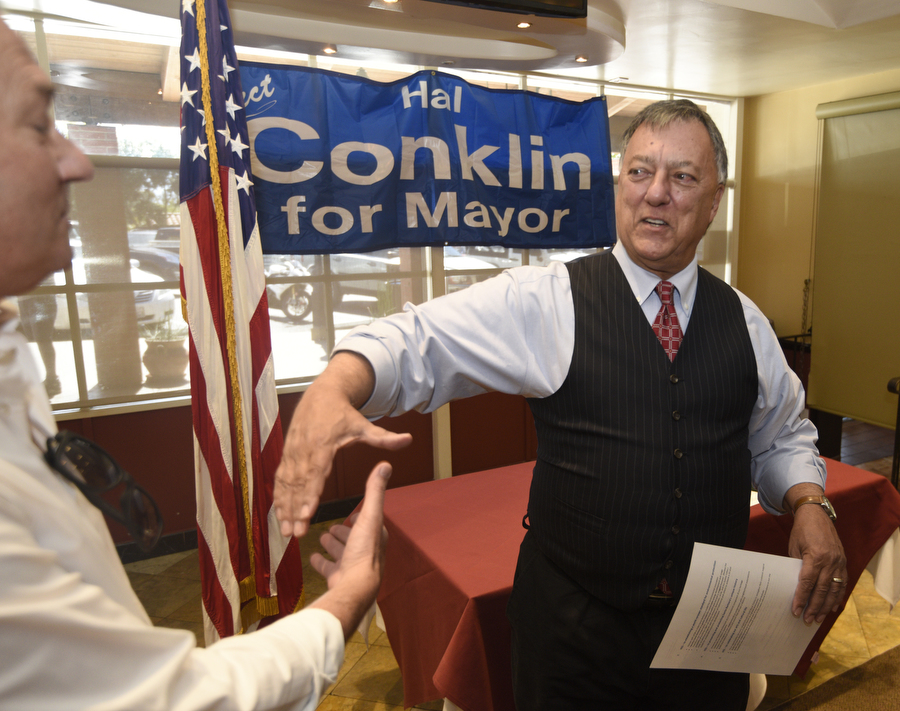Conklin Safe from Santa Barbara Term Limits Law
The Mayoral Candidate Recently Unearthed the 1994 Court Ruling

Mayoral candidate Hal Conklin has furnished the Santa Barbara Independent with a 1994 state Court of Appeal decision offering clear evidence to show he is not prohibited by term limits from serving in the city’s top elected office.
Conklin’s campaign has been dogged by allegations, echoed loudly in certain cranky-pants precincts of the political universe, that he is not eligible to become mayor because of the city’s 1990 term limits law, which forced him to resign the post in 1995.
He quit after more than a year of litigation that challenged his election in 1993, at a time when the World Wide Web was being born and Ryan Gosling, Justin Timberlake, Britney, and Christina were all on “The New Mickey Mouse Club.”
However, the 12-page decision in Conklin’s case includes an unequivocal statement, previously unreported, that the ruling applies only to the 1993 ballot — not to any future bids for mayor or city council that Conklin might make:
“Of course,” the three-justice decision says in its final sentence, “(the term limits law) does not prevent Conklin from running for the office of mayor or city councilperson at some time in the future.”
Conklin said in an interview on TV Santa Barbara’s “Newsmakers” program that he only recently unearthed the 23-year-old unpublished decision in an old box of files, after trying and failing to obtain a copy from the City Attorney’s office.
By any reasonable man standard, the language of the court decision seems determinative in leaving open Conklin’s legal option to run again, resolving a lingering question that has hung over his campaign in this year’s crowded and competitive five-person field.
A Walk down Memory Lane
Conklin, now 71, served four, four-year terms on council from 1977-93; when his term expired that year, he ran for mayor and was easily elected in a five-person field, with 45.9 percent of the vote.
However, voters in 1990 had approved an amendment to the City Charter that restricted the number of years an individual could serve on council and as mayor, during a period when term limits became an extremely popular reform in cities, counties, and states across the nation; the political fad included California, where statewide voters the same year capped terms for state legislators.
At first glance, Santa Barbara’s measure seemed straightforward, but it turned out to be legally murky in the special case of Conklin.
The relevant portion of the law reads this way:
“No person shall be eligible to serve as a member of the City Council for more than two (2) consecutive four (4) year terms. No person shall be eligible to serve as Mayor for more than two (2) consecutive four (4) year terms. No person shall be eligible to serve cumulatively as a member of the City Council and Mayor for more than four (4) consecutive four (4) year terms”
Although he had served four consecutive terms as a council member, Conklin believed he was eligible to seek a new, four-year stretch as mayor; his council colleagues agreed, and cleared the way for him to do so, by ordering the city clerk to put his name on the ballot despite a lawsuit to prevent it, filed by Rafael Franco, one of his opponents.
Deep in the Legal Weeds
After the election, however, a class action suit filed by 16 voters successfully challenged the result, and a Superior Court judge declared the office of mayor vacant. Conklin appealed, but the Court of Appeal upheld the ruling; the state Supreme Court refused to take up the case, and Conklin resigned on January 3, 1995, making Mayor Pro Tempore Harriet Miller the new chief executive.
The case came down to conjunctions, the difference between “and” and “or.”
“The heart of the matter,” the ruling said, “is in the third sentence of the section:
“No person shall be eligible to serve cumulatively as a member of the City Council and Mayor for more than four (4) consecutive four (4) year terms.’
“Conklin claims he is not prohibited from serving his term as mayor because he had not served as mayor before. He observes that the four-term limitation refers to service as councilmember and mayor. He believes that in order to prevent from serving his first term as mayor, the limitation would have to read councilmember or mayor.
“We disagree.”
Boom. Welcome Mayor Miller.
Why It Matters
As a practical matter, the clarity of the decision’s final sentence, plainly leaving the door open for a future Conklin mayoralty, should rid him of a political distraction that he has spent much time trying to put to rest, and allow him to focus on the campaign trail on more substantive issues facing the city.
Still, he faces a difficult road to victory, amid strong competition from three incumbent councilmembers, particularly Bendy White along the center of the political spectrum, liberal Cathy Murillo on the left, conservative Frank Hotchkiss, on the right, as well as the outsider insurgency of business executive Angel Martinez.
Don’t turn that dial.



